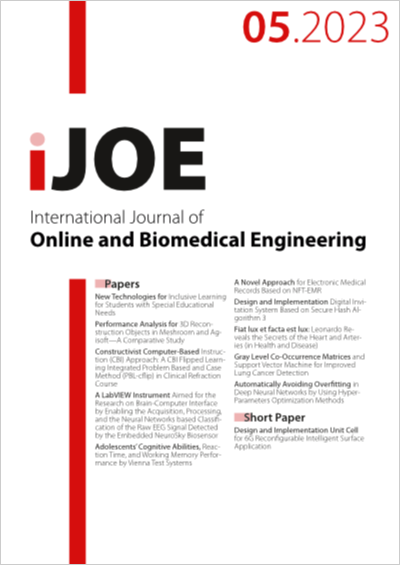A LabVIEW Instrument Aimed for the Research on Brain-Computer Interface by Enabling the Acquisition, Processing, and the Neural Networks based Classification of the Raw EEG Signal Detected by the Embedded NeuroSky Biosensor
DOI:
https://doi.org/10.3991/ijoe.v19i05.37857Keywords:
brain-computer interface, EEG signal, artificial neural networks, LabVIEW applicationAbstract
The Brain-Computer Interface (BCI) is a scientific field aimed at helping people with neuromotor disabilities. Among the current drawbacks of BCI research is the need for a cost-effective software instrument for simple integration with portable EEG headsets, the lack of a comparative assessment approach of various techniques underlying recognizing the most precise BCI control signal –voluntary eye-blinking, and the need for EEG datasets allowing the classification of multiple voluntary eye-blinks. The proposed BCI research-related virtual instrument accomplishes the data acquisition, processing, features extraction, and the ANN-based classification of the EEG signal detected by the NeuroSky embedded biosensor. The developed software application automatically generated fifty mixtures between selected EEG rhythms and statistical features. The EEG rhythms are related to the time and frequency domains of the raw, delta, theta, alpha, beta, and gamma. The extracted statistical features contain the mean, median, standard deviation, route mean square, Kurtosis coefficient, mode, sum, skewness, maximum, and range = maximum-minimum. The results include 100 EEG datasets to classify multiple voluntary eye-blinks: 50 datasets with 4000 recordings and 50 with 800 recordings. The LabVIEW application determined the optimal ANN models for classifying the EEG temporal sequences corresponding to detecting zero, one, two, or three voluntary eye-blinks.
Downloads
Published
How to Cite
Issue
Section
License
Copyright (c) 2023 Oana Andreea Rusanu

This work is licensed under a Creative Commons Attribution 4.0 International License.



